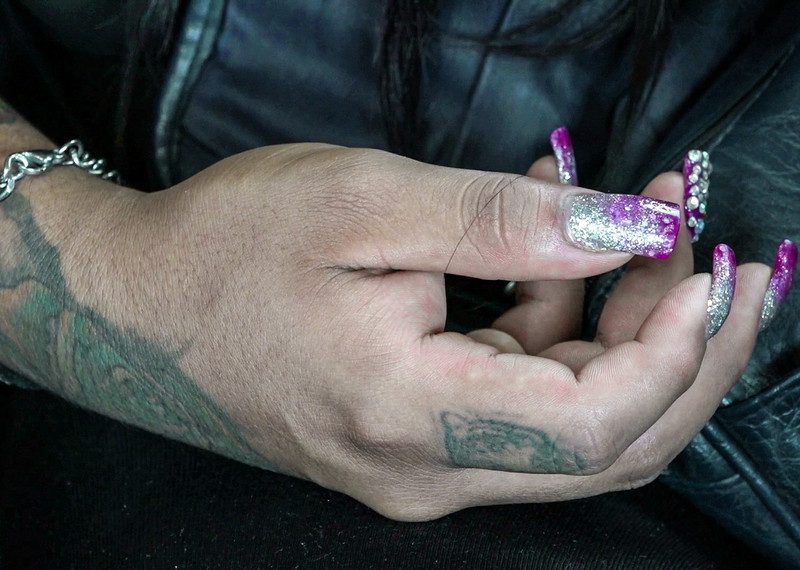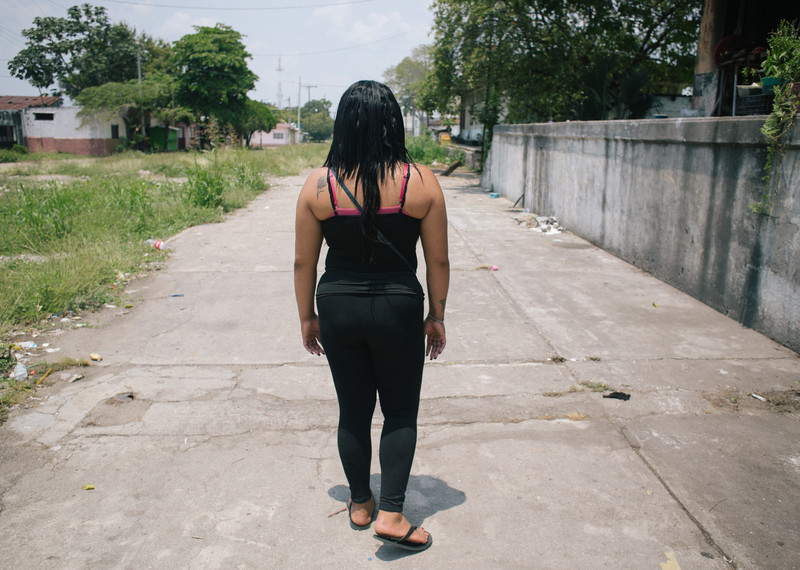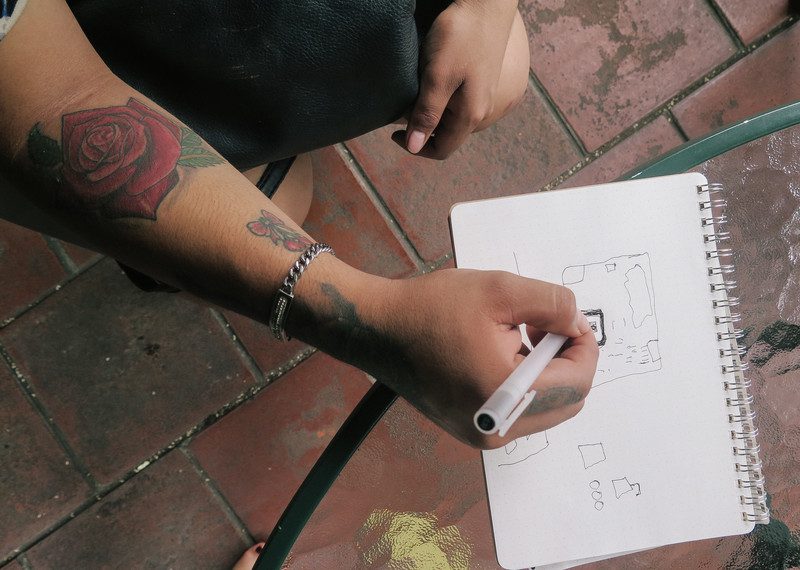When 25 year old Cristel* woke up one morning in April 2017, lying on the floor of a freezing 2×2 meter room, her clothes reeking from the lack of washing, her stomach churning from a diet consisting of three burritos a day and her eyes aching, desperate for natural light and air, unable to talk to anyone and not knowing what the future held for her, she thought she had reached the lowest point in her life.
Eight days earlier, Cristel had been arrested by the USA’s Immigration and Customs Enforcement Agency in Tijuana and taken to the Otay Mesa Detention Centre in San Diego, California. She was placed in solitary confinement. No explanation was given.
That cold morning she nearly forgot about the extreme violence that had taken over her life in her native El Salvador.
The seemingly endless death threats that kept her awake at night, the impossibly high extortions that left her without money to buy food, the bullet that had killed her boyfriend just a few months before. All the reasons why she knew staying in El Salvador was akin to committing suicide.
She thought she had reached the end. That after five years on the road, there were no options left for her. That there was nowhere else to run. She could not bear the thought she would be forced to go back to El Salvador, to the life she was so scared of.

We met Cristel half a dozen times over a period of a year and a half. First in her native El Salvador, then in Mexico and in various points in between. Each time, her story would become more disturbing. So much so, that we began wondering how one individual could stand so much violence and uncertainty.
Fear, exhaustion and frustration manifest themselves in many ways. There are the physical changes, the weight loss, the dark circles around her eyes, progressively worse every time we met Cristel. The seemingly unstoppable bursts of tears, more unpredictable in each of our conversations. The weeks of silence and unanswered whatsapp messages which often left us wondering if anything had happened to her, if she had been killed. The open ended questions every time we talked — “what is going to happen to me?” being the more recurrent one.
what is going to happen to me?
Cristel
Life in the murder capital
There’s a peculiar feeling that invades you when walking the streets of El Salvador’s capital city San Salvador. Despite having one of the world’s highest murder rate – 81.2 per 100,000 inhabitants in 2016 according to official figures, way above the global average – violence is somehow hidden beneath the buzz of a Central American metropolis.
“One minute it is quiet and the next, people are killed right in front of you. That is how it works,” a taxi driver once told me.
Each neighborhood is controlled by a criminal gang, locally known as a Mara. One way they control the population is through extortion – hefty “taxes” that individuals and businesses are forced to pay. Missing a payment can mean a death sentence.
We met Cristel for the first time in March 2016.
The drive to her home, in one of the city’s most violent areas, took some planning. First we had to find a driver willing to take us there, then agree an emergency exit plan in advance.
We travel in a team of two, reporter and photographer, with the car windows down at all times. Local gang members want to see exactly who comes in and out of their area, and they do not like outsiders.
The driver would wait for us at the door, engine on. We had no more than 30 minutes.
Cristel welcomed us to her home with a wide smile. She had recently moved in with her boyfriend Daniel* to a small but cozy, colourful room in the front of an old house. In a corner were Cristel’s tools – an array of brushes, hair pins and nail polishes. The couple were happy, despite effectively sleeping in the entrance and corridor for everybody else living in the house.
And this is not the only hardship they faced.
Although Cristel was working in a beauty salon earning USD $5 a day, the Mara had been forcing her to pay USD $35 a week.
I have seen people being killed after they failed to pay the extortion. We can’t even report this to the police because they work with the gangs. Living in El Salvador is torture
Cristel
“How am I supposed to pay that much money?” she asked. “I have seen people being killed after they failed to pay the extortion. We can’t even report this to the police because they work with the gangs. Living in El Salvador is torture.”
But life was not always torture.
Cristel grew up a happy child in San Salvador. She had always known she was a woman. By the time she had finished high school she decided that wearing the clothes she felt comfortable in was not enough. She grew her hair, took hormones, started wearing make-up and changed her name. She says her family was always supportive.
But living as a trans woman in El Salvador was not easy. Gangs are deeply misogynistic organizations. For them, attacking a trans woman is often seen as a badge of honor.
The civil society organization COMCAVIS TRANS registered 28 serious attacks against trans people in El Salvador between January and September 2017, most of them killings.
When a local gang member who had tried to convince Cristel to go out with him realized she was a trans woman, a few years before we met her, things quickly turned ugly. She faced bullying and threats, followed by extortion and attacks. Finally, she was given 24 hours to leave the country.
“He told me that if I didn’t leave, he was going to kill me. He only gave me time to pack two changes of clothes and start a trip to the unknown. I had to go for the only reason that I’m a trans woman,” Cristel says.
He told me that if I didn’t leave, he was going to kill me. He only gave me time to pack two changes of clothes and start a trip to the unknown. I had to go for the only reason that I’m a trans woman
Cristel
The dangers of flight
By the time we meet her, Cristel had already left El Salvador twice.
The first time was in 2014. She made it all the way to the USA but came back when her mother fell seriously ill. The friend she travelled with is now living in the USA.
The journey there was more traumatic than she could have ever imagined.
Together with a friend who was also being threatened by gang members, she crossed the shallow river to Mexico and hailed a taxi to the border town of Tapachula. From there, they would head to Mexico City, then to Tijuana on the US border, before crossing to safety.
But Tapachula is the kind of place where the best-laid plans can go awry.
“I started to worry when the taxi started taking us through dark streets,” Cristel explains. She soon realized they were being kidnapped.

The two women were taken to an abandoned house, robbed and sexually abused for several days. One night, when their captors got drunk and forgot to lock the door, they
escaped. A woman who found them on the street took them to a local police station.
The police investigation was never followed up. After three hellish months in Mexico, Cristel returned to El Salvador.
Nowhere is safe
When Cristel met Daniel, she hoped things would finally get better. They had moved in together and the gang member who had been threatening her was in jail. But this period of respite did not last long.
The gang member soon began claiming money in the form of an extortion from inside prison. This seems to be a common practice.
By early 2017, her job at the beauty salon was no longer enough to pay the monthly “tax”. She was left with no choice but to work the streets at night.
Extortion rates for sex workers are notoriously high. She was also repeatedly attacked by gangs. When she went to the police, she realized they were working together. She felt trapped.
But she never imagined what would happen next.
In February 2017, the Mara killed Daniel. He was shot dead on the street in broad daylight. He had been receiving threats from the gangs, who said they would kill him if he didn’t leave Cristel.
“You are next,” a voice on her phone told her days after Daniel’s body was found. “You know full well you have earned two bullets for not paying us.”
All Cristel could do is promise to pay.
She got enough money together for one month. Her mother then tried to borrow money to pay for the following month, but was unable to get all she needed.
When Cristel went to the police to report the situation, she saw an officer talking to one of the men threatening her.
Cristel had run out of options. It was time to leave again.
An endless journey
We next met Cristel in Tapachula – the place she was kidnapped and sexually abused three years earlier. The last place on earth she wanted to be.
She is queuing at the town’s immigration centre with men, women and children from across Central America, plus countries such as Cuba, Haiti, India and Bangladesh.
They come morning and evening and try to persuade the Mexican authorities they are deserving of the chance to stay in the country as refugees, or at least get a one-year humanitarian visa – Mexico’s temporary solution to a spiralling refugee crisis.

It’s been just a few months since the last time we saw Cristel, but her appearance has changed. She looks exhausted and gaunt.
“I got the humanitarian visa,” she announces, with the lack of excitement that comes from not feeling safe.
When we get to Cristel’s home – a scarcely furnished room in a safe area of Tapachula – she bursts into tears.
“I need to leave now,” she says, her hands shaking and her face contorted by fear.
I need to leave now
Cristel
“I saw some of the guys from the same Mara that was threatening me in El Salvador. I cannot stay here.”
Cristel had been approached by a young man she recognized in the town’s central park, where asylum-seekers congregate.
“If you thought we were not going to find you, you were wrong. I know you came because you didn’t pay us. We gave you a lot of opportunities but it looks like you don’t understand,” he told her.
Back to the beginning
As soon as she could afford it, Cristel was on a bus to Tijuana via Mexico City, then across the US border.
But the political landscape had changed since Cristel had last made this journey in 2014. In President Trump’s America, securing asylum was going to be a lot harder.
Several years after the first time she crossed to the USA, she was arrested by the USA’s Immigration and Customs Enforcement Agency and placed in solitary confinement at the Otay Mesa Detention Centre in San Diego, California. From there, she was transferred to another detention centre in Arizona, handcuffed, put on a plane and sent back to her worst nightmare.

When Cristel landed in El Salvador, no one asked her any questions. No one wanted to know why she had left so many times; why she was frightened; if she needed protection. Officials just gave her two pupusas (A thick corn tortilla, typical dish from El Salvador) and a soda.
The last time we meet Cristel she has gone back to her mother’s home, to the dangerous streets, to the impossibly high extortion.
“I thought trans women were respected in the USA. I saw how a few of my friends lived before Trump was elected, but things are no longer like that. They treated me like a parasite, like a criminal,” Cristel tells me.
I’m exhausted of being forced to pay to live. I want to leave but there’s nowhere to go. I work and live to pay the extortion. It’s all about the extortion
Cristel
“I’m exhausted of being forced to pay to live. I want to leave but there’s nowhere to go. I work and live to pay the extortion. It’s all about the extortion.”
Every time she is late – even by a day or two – she is brutally beaten.
Cristel’s tale is far from unique.
Central America’s refugee crisis manifests itself in countless similar endless journeys: five steps forward, ten steps back. People make the same journey dozens of times. They are deported and they try again. It is desperation that fuels them.
Cristel embodies one of the world’s most overlooked refugee crises. A victim of historic discrimination, failed immigration policy and, now, a new Trumpesque world where the most vulnerable are branded criminals, and those meant to help them are the ones putting people in danger.
I don’t want to be illegal. I just want to live and be safe
Cristel
“I don’t want to be illegal. I just want to live and be safe,” Cristel pleads.
“But they are going to kill me,” she says over and over, sobbing as if she were at her own funeral.
*Not their real names
A version of this text was published by the Washington Post


